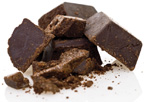Fruits and Vegetables Promote Weight Loss
 Researchers from the University of Sao Paulo (Brazil) found increased fruit and vegetable intake promotes weight loss in overweight adults. According to the study, each 100-gram increase in fruit consumption resulted in a reduction of 300 grams of body weight after a six-month period. Similarly, a 100-gram increase in vegetable intake associated with a 500-gram reduction in body weight after six months. Further, each 1-gram increase in fiber intake from fruit and vegetable sources resulted in a 115-gram and 180-gram loss, respectively, of body weight in the six-month period.
Researchers from the University of Sao Paulo (Brazil) found increased fruit and vegetable intake promotes weight loss in overweight adults. According to the study, each 100-gram increase in fruit consumption resulted in a reduction of 300 grams of body weight after a six-month period. Similarly, a 100-gram increase in vegetable intake associated with a 500-gram reduction in body weight after six months. Further, each 1-gram increase in fiber intake from fruit and vegetable sources resulted in a 115-gram and 180-gram loss, respectively, of body weight in the six-month period.
Indulge Your Sweet Tooth?
 It's true: Chocolate really can be good for your health. Cocoa, the primary compound in chocolate, is high in polyphenols (natural antioxidants), and research suggests cocoa contains five times the polyphenols of an apple. Choose dark chocolate for its numerous health benefits. Researchers from the University Hospital of Cologne (Germany) found that a daily serving of dark chocolate reduced both systolic and diastolic blood pressure by 2.9 mm Hg and 1.9 mm Hg, respectively, without affecting body weight, blood lipid levels, or blood sugar (glucose) levels. Additionally, Harvard Medical School researchers have found flavanol-rich chocolate boosts blood flow in the brain, thereby potentially reducing the risk of cognitive loss and dementia.
It's true: Chocolate really can be good for your health. Cocoa, the primary compound in chocolate, is high in polyphenols (natural antioxidants), and research suggests cocoa contains five times the polyphenols of an apple. Choose dark chocolate for its numerous health benefits. Researchers from the University Hospital of Cologne (Germany) found that a daily serving of dark chocolate reduced both systolic and diastolic blood pressure by 2.9 mm Hg and 1.9 mm Hg, respectively, without affecting body weight, blood lipid levels, or blood sugar (glucose) levels. Additionally, Harvard Medical School researchers have found flavanol-rich chocolate boosts blood flow in the brain, thereby potentially reducing the risk of cognitive loss and dementia.
What You Eat Affects How You Look
 In one of the first studies to look at how nutrients affect the skin, researchers in the United Kingdom have identified foods that reduce the appearance of skin aging. Higher intakes of vitamin C and linoleic acid lead to fewer wrinkles, less dryness and stronger skin. In contrast, consuming excess fats and carbohydrates gives skin a more aged look. Choose citrus fruits and colorful vegetables for vitamin C. Oils (such as safflower, sunflower, olive, peanut and sesame) and eggs are good sources of linoleic acid.
In one of the first studies to look at how nutrients affect the skin, researchers in the United Kingdom have identified foods that reduce the appearance of skin aging. Higher intakes of vitamin C and linoleic acid lead to fewer wrinkles, less dryness and stronger skin. In contrast, consuming excess fats and carbohydrates gives skin a more aged look. Choose citrus fruits and colorful vegetables for vitamin C. Oils (such as safflower, sunflower, olive, peanut and sesame) and eggs are good sources of linoleic acid.
Visit the Mediterranean - Without Leaving Home
 The Mediterranean diet emphasizes high consumption of grains, fruits, vegetables, legumes and nuts; good fats (olive oil and omega-3 fatty acids); and a sparingly low intake of red meat. University of Athens (Greece) researchers conducted a multicenter study involving 74,607 European men and women (ages 60 years or older at the start of the study); the Mediterranean diet was found to reduce the risk of death by 14 percent.
The Mediterranean diet emphasizes high consumption of grains, fruits, vegetables, legumes and nuts; good fats (olive oil and omega-3 fatty acids); and a sparingly low intake of red meat. University of Athens (Greece) researchers conducted a multicenter study involving 74,607 European men and women (ages 60 years or older at the start of the study); the Mediterranean diet was found to reduce the risk of death by 14 percent.

